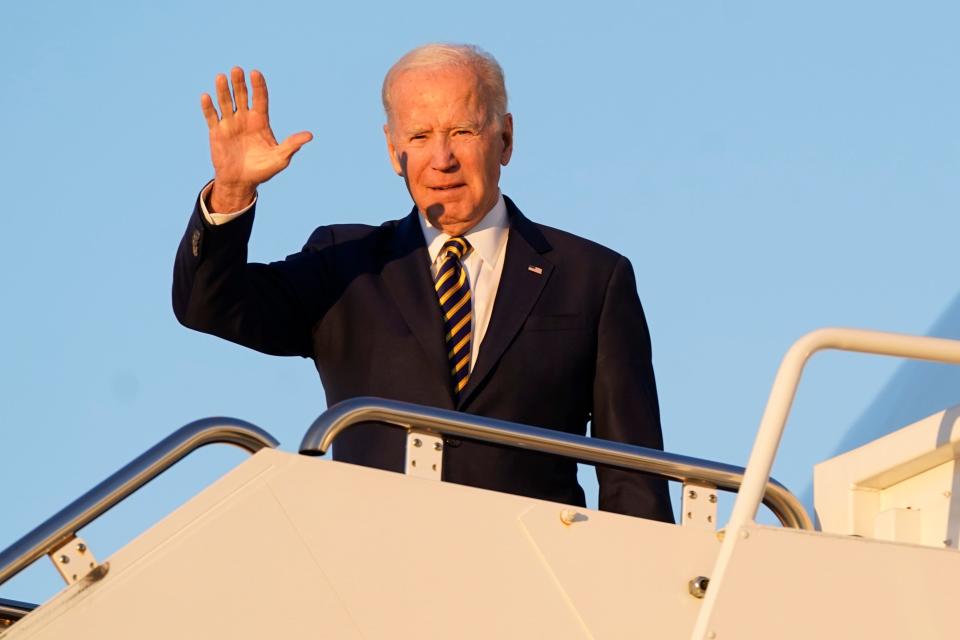Conservative states tell Supreme Court that Biden's student loan relief was a power grab
- Oops!Something went wrong.Please try again later.
WASHINGTON – A half-dozen states seeking to strike down President Joe Biden's student debt forgiveness plan told the Supreme Court on Wednesday that the administration vastly overstepped its authority with the $400 billion program.
The six conservative states – Arkansas, Iowa, Kansas, Missouri, Nebraska and South Carolina – argued that Biden violated the separation of powers by embarking on a loan forgiveness program the administration estimates will affect 40 million Americans.
"The administration is once again invoking the COVID-19 pandemic to assert power far beyond anything Congress could have conceived," the states told the court. "While President Biden publicly declares the pandemic over, the secretary and Department of Education are using COVID-19 to justify the mass debt cancellation."
Two federal courts have temporarily blocked the program, prompting Biden to announce Tuesday that the government would extend a pandemic-era pause on student loan repayments until the middle of next year as the legal questions are resolved.
Narrow path: Is student loan forgiveness dead? Hope is dwindling but path exists
Power?: Biden's ability to bypass Congress, starting with debt relief, faces legal hurdle
Stay in the conversation on politics: Sign up for the OnPolitics newsletter
Biden enacted the debt relief plan under the HEROES Act, which was passed after 9/11 sparked an American-led military campaign against terrorism. The act gave the president authority to forgive student loan debt in association with military operations or national emergencies. The Department of Education has asserted that the law allows loan forgiveness for Americans dealing with financial hardship because of the COVID-19 pandemic.
A federal judge in Missouri dismissed the states' request to block the program last month, ruling that they lacked standing to sue. While their case presented "important and significant challenges to the debt relief plan," the trial court ruled, "the current plaintiffs are unable to proceed." On appeal, the St. Louis-based U.S. Court of Appeals for the 8th Circuit sided with the states' request to temporarily halt the program.
On Friday, the Biden administration filed an emergency appeal at the Supreme Court, asking the justices to revive the program while the litigation continues. Congress, the administration told the high court, explicitly authorized the Department of Education to waive or modify regulatory provisions it deems necessary for federal student loans.
The lower court's ruling, the federal government told the Supreme Court on Friday, "leaves millions of economically vulnerable borrowers in limbo, uncertain about the size of their debt and unable to make financial decisions with an accurate understanding of their future repayment obligations."

Biden's plan would cancel up to $20,000 in student loan debt for Pell Grant recipients and $10,000 for other borrowers, for people earning up to $125,000 a year or part of a household where total earnings are no more than $250,000.
In their brief Wednesday, the states argue that the HEROES Act requires "a real connection to a national emergency." Instead, they argue, the administration's "reliance on the COVID-19 pandemic is a pretext to mask the president’s true goal of fulfilling his campaign promise to erase student-loan debt."
A U.S. District Court in Texas has also halted the program in a separate lawsuit. That litigation is currently pending before the New Orleans-based U.S. Court of Appeals for the 5th Circuit and could eventually be combined at the high court with the suit filed by the states.
The case filed by the states is the third time that the loan forgiveness program has come before the Supreme Court. Associate Justice Amy Coney Barrett denied an emergency appeal from a Wisconsin taxpayer group Oct. 20. Barrett denied the request to block the program without explanation, as is often the case on the court's emergency docket.
She denied a second challenge to the program on Nov. 4. A conservative legal group had filed an emergency appeal on behalf of two people entitled to "automatic" cancellation of their debt. The plaintiffs had claimed that the automatic cancellation of their debt would create "excess tax liability under state law."
The Supreme Court could rule on the administration's request relatively quickly, potentially within a matter of days.
This article originally appeared on USA TODAY: Red states slam Biden's student debt relief plan in Supreme Court case

